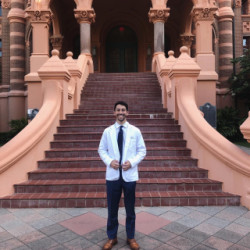My life as a pre-med student seemed to be all about comparisons: Were my grades and MCAT score high enough to make me a competitive applicant for medical school? Would my long list of extracurricular activities impress admissions committees? How did I stack up against the countless other smart, passionate, hard-working students hoping to pursue the dream of becoming a physician? When I started medical school, I naively assumed that things would be different. I still planned to study hard and dedicate myself to a rigorous four years of training, but I hoped that I would finally be able to focus on medicine, with less time and energy dedicated to resume-building pursuits outside of class and clinic hours.
During my first year, I signed up for one academic track and joined only a handful of clubs that interested me to avoid over-committing myself. As the second semester rolled around, I had to choose between a summer preceptorship required for my scholarly concentration or an eight-week research project. I didn’t want to make my decision based on what other students were doing, but it once again felt like everyone around me was finding ways to stand out. Scared that I was falling behind my peers who had already begun publishing case reports and traveling to conferences to present their work, I opted for research and discontinued my enrollment in the track.
At the time, it felt like I made the right choice — I had an opportunity to work at a world-renowned cancer center with a wonderful mentor whose lab publishes dozens of papers each year. Considering the prevailing notion that publications are necessary to be a competitive residency applicant nowadays, I was convinced that walking away would be a mistake. But did any of that really matter if I wasn’t genuinely interested in research? If I didn’t see myself as a future “physician scientist,” what would I gain from the experience? I spent much of that summer asking myself these questions as I pored over the results of a multi-center trial examining patient reported outcomes in individuals treated with MR-guided radiotherapy.
I was extremely fortunate to spend a summer at this institution surrounded by brilliant, passionate academicians with a knack for helping students find their way in the world of clinical research. Still, I didn’t feel the spark of excitement and ambition that I am accustomed to when working with patients directly. Each day was more of the same: In the morning, I read articles and attended meetings that barely managed to keep my attention, and in the afternoon, I organized data and ran statistical tests for a project that likely would not survive past my eight-week elective. No matter how much effort I put in, I could not ignore the reality that my work was unimportant compared with that of the PhDs, computational scientists, and graduate-level students who had actually dedicated their careers to research.
Since that brief stint in the world of research, I have largely turned my focus to the aspects of medicine that interest me the most: medical history and humanities, the improvement of study resources for medical students, and of course, mastering the basic knowledge and skills that a future physician needs to be successful. Surveying friends who have been entrenched in various projects that they deem “necessary” for career purposes, however, I have come to realize just how many of my colleagues still are involved in work that they describe as meaningless, unproductive, and unfulfilling. Their names are buried in a long list of student contributors, their work ends up in journals with little impact, and they don’t feel like they are making a significant contribution to the scientific community.
I believe that the problem here lies in the intention behind medical student research. For one, we have created an environment that favors quantity over quality; rather than nurturing trainees’ genuine interests and original projects, we encourage a seemingly endless stream of case reports and literature reviews. Second, we have lost sight of the goal, which is to improve patient care. While no one expects a medical student to find the cure for cancer, we do not advance the practice of medicine by putting out yet another CV-padding publication.
Looking back, I think that a few things went wrong in my personal research experience. At the time, I was just beginning to think about entering the field of radiation oncology. I have since decided to pursue hematology and medical oncology instead, so perhaps I would have been more engaged if the subject were different. My position was also completely remote due to COVID-19 restrictions, and I can’t help but wonder if things would have been different if the world weren’t so chaotic at the time. Maybe I will change my mind and come back to research someday, but for now, I feel like I am better off using the time that I have to focus on becoming an excellent clinician.
Research is a fundamental part of medicine, but it is not for everyone. Although I may not know the key to achieving balance in medical student research, I think our priority should be fostering a culture that focuses on caring for our future patients. Many of us will achieve this goal through clinical practice, others will do so through careful study of patient outcomes and best practices, and some may find a balance between the two, but expecting everyone to do both is unrealistic and unnecessary.
What extracurricular activities, if any, did you participate in during medical school?
Jacob Herstein is a fourth-year medical student in Galveston, TX. He enjoys basketball, reading, and taking his dog to the beach. He tweets @JacobHMed. Jacob is a 2022-2023 Doximity Op-Med Fellow.
Illustration by April Brust






